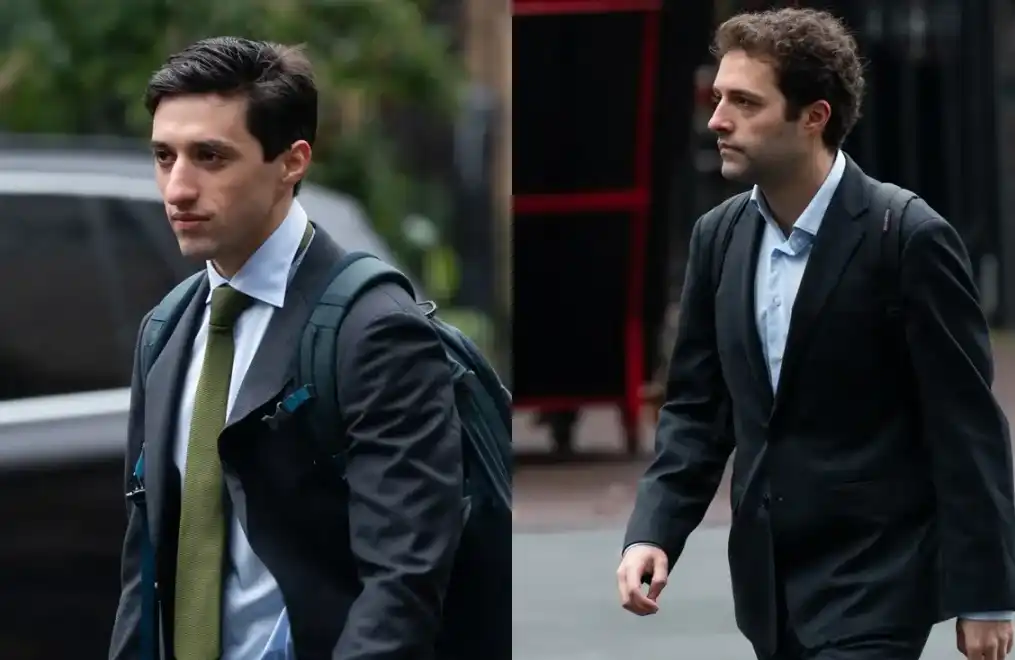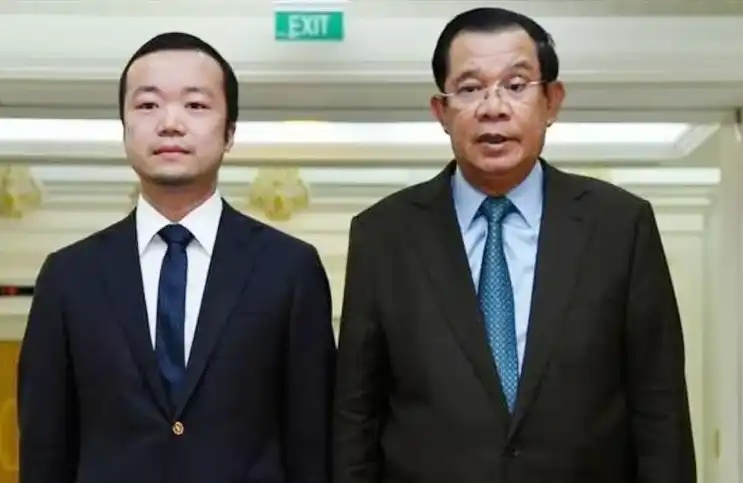First Ever Crypto Sandwich Attack Criminal Case: MIT Brothers Who Profited $25 Million to Stand Trial
Original Title: MIT Grad Brothers' Trial Puts Focus on the 'Wild West of Crypto'
Original Author: Miles J. Herszenhorn, Bloomberg
Original Translation: Luffy, Foresight News
Two brothers who recently graduated from the Massachusetts Institute of Technology faced trial this week. This case could unveil a secretive and controversial cryptocurrency trading strategy.
James Peraire-Bueno and Anton Peraire-Bueno are accused of executing a "sandwich attack" on the Ethereum blockchain, allegedly stealing around $25 million from other traders. The brothers have pleaded not guilty, arguing that their actions were a legitimate operation within the unregulated market space, and that the so-called victims were also engaging in similar trades.

Anton Peraire-Bueno (Left) and James Peraire-Bueno (Right) arrive at the New York Federal Courthouse on Tuesday
This case has sparked division within the cryptocurrency community. Many are anticipating that the trial set to begin on Wednesday in the Manhattan Federal Court will bring clarity to the "Maximum Extractable Value (MEV) strategy." The MEV strategy involves reordering, excluding, or including transactions before they are posted on-chain.
"Honestly, I never thought this would constitute a crime," said Evan Van Ness, Chief Investment Officer of the cryptocurrency trading firm TXPool Capital, referring to the case against the two brothers. "If people think the cryptocurrency space is the Wild West, then MEV is the Wild West of the crypto world."
While some MEV operations are considered to enhance cryptocurrency market efficiency, the sandwich attacks carried out by alleged victims like the Peraire-Bueno brothers are highly controversial. Attackers use bots to sandwich orders in front and behind of other users' transactions: first pumping up the price, then immediately selling to profit, with the cost borne by the user caught in the middle. Some view this behavior as market manipulation, but currently, it is not illegal.
Companies that carry out Sandwich Attacks typically act covertly, often going to great lengths to conceal their identities. However, during the trial of the Peraire-Bueno brothers, one such company came to light. Court documents reveal that the primary victim of the two brothers was Savannah Technologies—an obscure Israeli firm. The company's CEO, David Yakira, is expected to testify as a prosecution witness, confirming that the brothers launched an attack against Savannah's MEV bot, resulting in the company losing $13 million.
The lawyers for the Peraire-Bueno brothers declined to comment; Yakira and the lawyers for Savannah Technologies also refused to respond; the prosecutor did not reply to a request for comment.
The prosecutor stated that 29-year-old James and 25-year-old Anton first studied the transaction behavior of Sandwich attackers and then devised a trap plan. The Sandwich Attack perpetrators wrote a program for the bot to filter out profitable targets from pending transactions on the blockchain—usually large-value transactions or those involving low-liquidity tokens.
The prosecution alleges that the two brothers executed this plan in April 2023: they initiated multiple small transactions with low-liquidity tokens to lure the targeted bot. An expert hired by the defense mentioned in court documents that one bot, in an attempt to sandwich the Peraire-Bueno brothers in a transaction worth less than $700, deployed nearly $5 million.
The prosecutor also pointed out that the brothers discovered a vulnerability in the MEV Boost code. MEV Boost is open-source software mainly used by Ethereum network operators. The prosecution stated that leveraging this vulnerability, the Peraire-Bueno brothers were able to view the full contents of the proposed on-chain block and reorder it for personal gain—essentially, sandwiching the attack bot by selling the coins shortly after it bought low-liquidity crypto.
"The brothers essentially tricked the bot into conducting what should have been a securely executed Sandwich Attack according to network rules," said Matt Cutler, CEO of blockchain infrastructure firm Blocknative Corp. "But due to this vulnerability, the attack was not secure."
Meanwhile, the defense argues that companies executing Sandwich Attacks willingly engage in transactions, and ownership of the funds has already transferred.
Defeating the Bot: Modus Operandi Enhanced by Elite Tech Education
The prosecutor stated that the brothers acquired the technical skills necessary to carry out the alleged fraud during their studies at "one of the most prestigious universities in the United States." Anton graduated from MIT in 2024 with a Bachelor's degree in Computer Science and Engineering; James obtained Bachelor's and Master's degrees in Aerospace Engineering from the same school a few years ago. An MIT spokesperson declined to comment on the case.
The prosecutor attempted to characterize the case as a simple theft, guiding the jury's focus to the actions of the two brothers. To prove the brothers had criminal intent, the prosecution plans to point out that Anton had searched for "which is worse, jail or prison" and "where do criminals usually hide money" on the internet. The two face the most serious fraud charge, which carries a maximum sentence of 20 years in prison.
Prior to the trial, the prosecution expressed a desire to minimize references to sandwich attacks. They requested that U.S. District Judge Jessica Clarke prohibit the two brothers from presenting expert testimony on sandwich attacks, claiming that "in any case, the brothers' actions constitute fraud" and that "excessive discussion of sandwich attacks could prejudice the jury against the prosecution's victim."
Last week, Clarke made a ruling allowing the Peraire-Bueno brothers to have most expert witnesses testify, provided they do not blame the victim.
This may be a delicate line to walk, as the brothers seek to contextualize their behavior within what their lawyers have called a "high-risk adversarial context." In a recent court filing, they rebutted the prosecution's allegations of unlawful intent:
"One who attempts to foil a sandwich attack, defeat MEV bots using the attacker's own tactics, has reason to believe they have done no wrong," the Peraire-Bueno brothers wrote in the filing.
A Highly Secretive World
Within the cryptocurrency community, some who find the charges against the Peraire-Bueno brothers reasonable also acknowledge reservations about sandwich attacks.
"Even if you consider MEV searchers (i.e., sandwich attackers) to be bad actors, you can't therefore argue that stealing their money is justifiable," Ethereum Foundation researcher Dankrad Feist wrote on X platform in May 2024. "Stealing from a thief is still theft."
Feist stated on Tuesday that his views on the case have remained unchanged since the publication.
A report cited by both sides shows that 75% of sandwich attacks can be traced back to only 20 accounts, but little is known about the information regarding these accounts.
Savannah Technologies and Yakira also have low public profiles. According to Yakira's LinkedIn profile, he graduated from the Hebrew University of Jerusalem in 2015 and went on to pursue a Ph.D. in Cryptography at the Israel Institute of Technology; from 2017 to 2020, he served as a research director at the Israeli cryptocurrency company Orbs.
Currently, the Peraire-Bueno brothers are accused of being the "identities of the traders who stole $12 million from other traders," which remains unknown.
"MEV is a highly secretive world," Cutler recalled at a cryptocurrency conference where "traders wore motorcycle helmets to conceal their identities." He noted that watching how the judge and jury tackle the complex issues related to MEV in the case will be very interesting.
"At the very least, I will be closely following the trial to see how the court's depth of consideration is revealed when contemplating future precedents," he said.
Welcome to join the official BlockBeats community:
Telegram Subscription Group: https://t.me/theblockbeats
Telegram Discussion Group: https://t.me/BlockBeats_App
Official Twitter Account: https://twitter.com/BlockBeatsAsia


 Forum
Forum Finance
Finance
 Specials
Specials
 On-chain Eco
On-chain Eco
 Entry
Entry
 Podcasts
Podcasts
 Activities
Activities
 OPRR
OPRR








